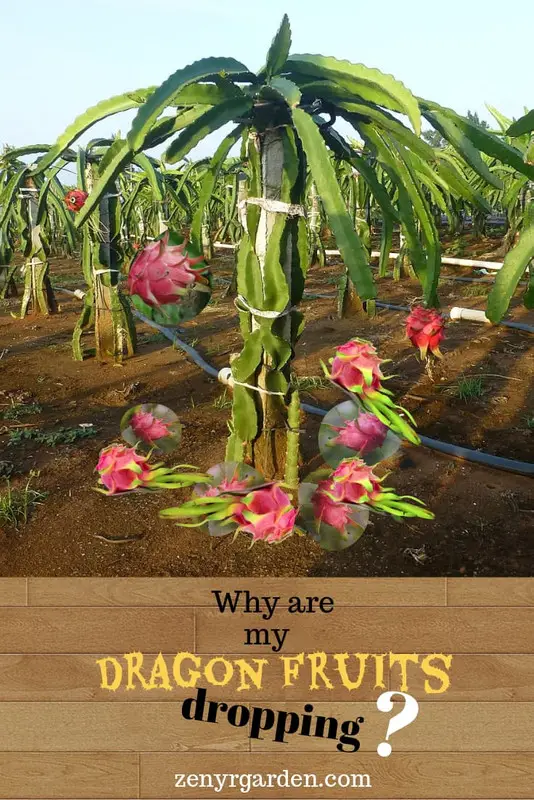Dragon fruits dropping off the branch may be because the fruits have been left on the trees for way too long. They naturally drop off then as they get over-ripe. When the mother branches are not strong enough to nourish the fruits, they might also abort them.
This is to direct energy for making sure of the plant survival. If the fruits don't fall off, the plants may get exhausted and die off. So, in a way this can be looked at as a survival mechanism.
Let's see some more ideas on why dropping might happen:
#1 The Lack of Water
Although dragon fruit is a type of cactus, they like good moisture around the base but not standing/static water or wet feet. This interesting thing has been observed by a dragon fruit grower in Australia.
Some of her friends say, 'But dragon fruit is a cactus, why do we need to water it a lot?'. From her insights, watering moderately actually helps with fruiting & fruit sweetness, something that her friends haven't had for a while.
If the plants don't get enough water to nourish themselves, then they basically can't support their juicy dragon fruits. Thus, they let them go & drop the fruits. Maybe later our dragon babies!
When buds, flowers & fruits are forming they suck the water out of the branches like they've been left hungry for weeks. The mother branches may get thinner, less plump & dried up. Fruiting takes a lot of energy.
So, approaching the fruiting stage, water lightly but frequently. Allow them time to absorb the moisture. Check if the soil is well-draining. Also, see if the weather in your local area is too sunny or a bit cooled down. Then, adjust the water amount accordingly. Water, with CO2 & sunlight, helps with photosynthesis to create the sugar for the fruits & plants.
On the other extreme of the scale, the fruits may be dropping because of:
#2 Too Much Water
On the other far end of the scale, over-watering might cause the fruits to drop. This happens in farms where they've been severely flooded for quite some time. It might be worse if the water has a high salt content that the plants have not had time to adapt to yet.
Fruits that are nearly ripe or still young will begin to fall off gradually one by one. This may be a signal that the mother plant roots are in some trouble & starting to rot. The rot may then spread to the stem of the plants.
As this signals to the plants, 'Baby fruits, we may not be able to support you & your future growth in a situation/conditions like this now', they drop the fruits to conserve some energy for ensuring survival of the whole.
So don't water the plants too much. If there's too much water 10-15 days before the fruits reach their peak, they may crack and turn out less sweet. Make sure your soil drains well & doesn't have hardened clayey stuff underneath that could hold water in for quite some time.
And number 3, there may be:
#3 Not Enough Nutrients
Maybe you've been feeding your plants enough food but check if there are any little suckers in the soil. These are the fungi or bacteria that may be enjoying the food with your dragon fruits.
Check the soil pH as well. If it's around 6-7, then it's good. If it's quite low, around 4-5, then it may be too acidic. Acidic soil is a great home for the bad guys like nematodes. It inhibits the nutrients intake of the roots.
This may also be caused by the design of design fruit posts. If the in-ground land to plant the dragon fruit posts is clayey & hardened, then nutrient intake may be low.
/clayey-soil-with-standing-water.jpg)
Looking at the mother branches while carrying fruits: Are they crinkled up & much thinner than usual?
As the plants approach flowering & fruiting stage, feed them some more phosphorous & potassium. Chicken manure is a great source of potassium. Growers usually top dress their soil with this stuff. It also helps decompose the hay.
Also, look out for:
Pests & Fungi
/fungi-on-dragon-fruit.jpg)
Fungi like the dragon fruit canker Neoscytalidium dimidiatum can get onto the dragon fruit. Yucky! When they penetrate deep inside, there is almost no way to save the fruits then. The fungi suck the good juice out of the fruits. The fruits then may turn dry & fall off. This disease spreads really fast.
We think this might relate to other environmental factors. Not sure how to treat this for now. But we think preventative measures are better. We'll share with you more as we find out more about this.
Some folks use copper-based spray. They make sure the water amount is not too high, especially in rainy season when there's high humidity. Don't over-feed the plants too much. This weakens their natural defense system & thus they grow dependent on extra nutrients. The excess amount which the plants don't take in any more is enjoyed by the fungi. Some folks say that over-feeding might also be a reason for fruit dropping.
But after all:
Maybe It's All Natural
Just like the phenomenon of bud aborting, mother nature may change her mind & decide to drop the fruits when conditions are not supportive or sufficient. We believe she knows it best and what is best for her.
If you've already checked everything from the soil, the water, the roots, the pests and your plants are doing okay, then it may be too many fruits and the mother plants need to shed some off. Don't worry too much in this case. It will be okay.
In some places like California where it's too hot, many growers have seen lots of buds dropping (bud abortion) because of the extreme heat waves. Not directly related but adenium (aka desert rose) growers have also noticed flowers dropping at times when it reaches 100F (40C) in the summer.
Weak Pollen from the Start
Sometimes, if the pollen is weak from the beginning, then fruits may form but they can grow quite weak. They don't look like they're going to make it. Other than genetics, rain may affect the quality of the pollen. Fresh pollen work better than some older or not-well-stored ones.
Ms. Kim, a dragon fruit grower, shows the weaker fruits from weak pollen here:
American Beauty part 3 Collusion Not forming fruitTo Keep the Fruits on the Branch
To prevent dragon fruits from dropping off, you can try:
- Water lightly but more frequently as fruits are forming
- Off gas the chlorine for some days if you use tap water
- Not watering too much as it may cause rot & cracking
- Rainbow sprinkle the base so it's just moist, not wet
- Feed P & K during flowering & fruiting stage
- Some chicken manure to boost K & decompose hay
- Make sure the soil is not too acidic & is well-drained
- Don't over-feed (love but not too much love)
- Use fresh strong viable pollen
And just a note, rainbow sprinkling means sprinkle the plants, so the water shoots out like the curve of a rainbow. And not directly or going full force into the base. In more poetic words, it's like every water droplet is parachuting down lightly on the land and plants.
Hope you will get good fruits & See you again next time.
Thanks to:
Share or pin this post!


